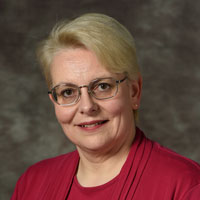Physician Educator Spotlight: Carol Ann B. Diachun, MD, MSEd
 Name:
Name:
Carol Ann B. Diachun, MD, MSEd
Title and Faculty Appointment:
Clinical Professor of Anesthesiology
Associate Chair for Education and Residency Program Director
University of Florida College of Medicine - Jacksonville
Undergraduate & Graduate Medical Education:
Stanford University School of Medicine (MD)
University of Pennsylvania & Stanford University (Anesthesiology Residency)
University of Rochester Warner School of Education (Masters of Science in Health Professions Education)
Brief Educational Biosketch:
I completed residency in anesthesiology in two locations – starting at the University of Pennsylvania and finishing at Stanford University to be closer to my husband. Completing my residency in two excellent programs was a huge benefit to me. I learned multiple methods of practicing anesthesia, was exposed to twice as many teaching styles and gained many more mentors. I stayed on as Clinical Instructor at Stanford University until 2000, when I moved to the University of Rochester to be Division Chief of Vascular Anesthesiology where over twelve years, I developed four resident rotations in vascular anesthesia including the complete curriculum with interactive lectures and simulations and pre/post-testing and reflection exercises as evaluation aids. In Rochester, my education interests expanded - serving as residency curriculum director, associate residency program director, and chair of the Clinical Competency Committee. I also pursued additional education training as the Lowell A. Glasgow Dean’s Teaching Fellow in 2009-2011 and completed a Master of Science in Health Professions Education from the University of Rochester Warner School of Education in October 2014. That same year I was recruited to the University of Florida – Jacksonville to serve as residency program director and associate chair for education, where I have used my masters concentration in program development and evaluation to redesign and improve the residency program. I have been involved in anesthesia education at the national level giving numerous presentations at the Society for Education in Anesthesia and American Society of Anesthesiology. I have served as Program Director for SEA national meetings, as Chair and Chair-Designee of the SEA Educational Meetings Committee, on the SEA Board of Directors, and on the advisory board for Anesthesia Toolbox, a collaborative effort by ~60 anesthesia programs to design and implement an international-level anesthesia residency curriculum. Education is my passion and I’m loving my role as a mentor to new educators in anesthesia.
Society/Committee Memberships:
Society for Education in Anesthesia (SEA):
- Board of Directors
- Chair & Chair-Designee, Committee on Education Meeting
- Program Director, Milestones & Assessment SEA National Meeting, Salt Lake City, UT
- Member, Committee on Faculty Development
- Member, Committee on Residency Curriculum
American Society of Anesthesiologists (ASA):
- Committee on Women in Anesthesia
- Committee on Physician Wellbeing
What drew you to a career in anesthesiology education?
I think I was probably destined to become a teacher. I come from a family of teachers – both my parents and my siblings are teachers. I’ve been surrounded my whole life by descriptions of lesson plans, homework, and problem students. There were more red pens in my house than I could count. Upon becoming an anesthesiologist, I knew I too would enjoy sharing my expertise and my love of caring for people with new trainees. For over two decades, I have been doing just that - teaching residents, medical students, fellows and other faculty.
What are a few facts about you people may not know?
In a past life I was a dancer. My childhood aspiration was to dance in New York as a “Rockette.” I had the correct height, but multiple knee injuries led me down another path. Today I enjoy yoga, swimming and traveling – I’ve been to every state in the US except Alaska!
What is your advice to an aspiring, young anesthesiologist educator?
It’s all about relationships. The more you interact with your learners, the better their learning and the more fulfilling for you as a teacher. Learning is a social process. The more you interact with your peers, the more mentorship you will receive. Reach out to other educators. A mentor can open the door to many opportunities. Finally, the more you interact with yourself, the more wellness you will experience. Don’t forget to schedule time for you.


